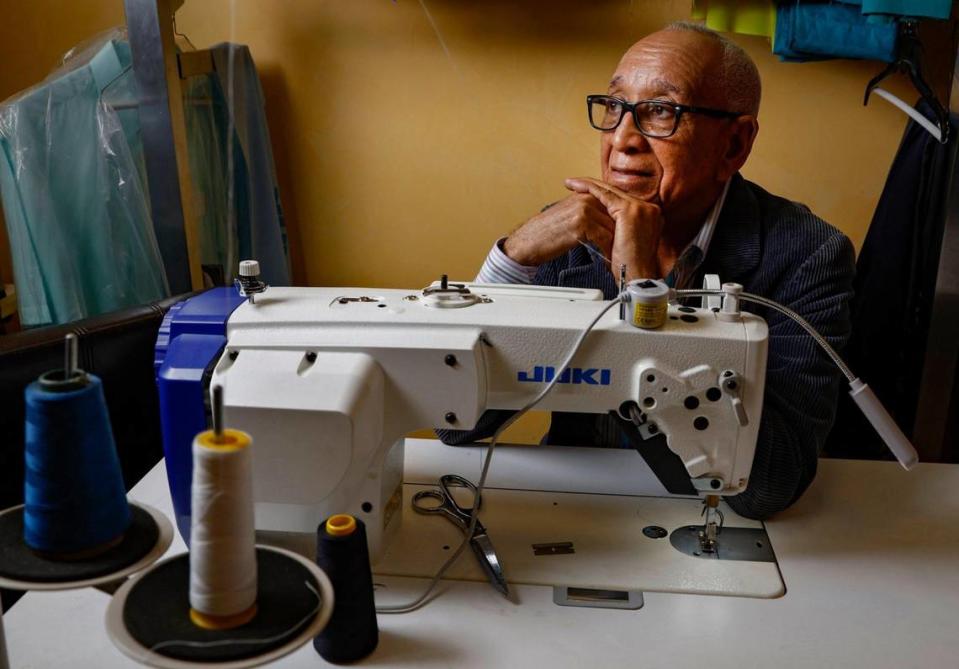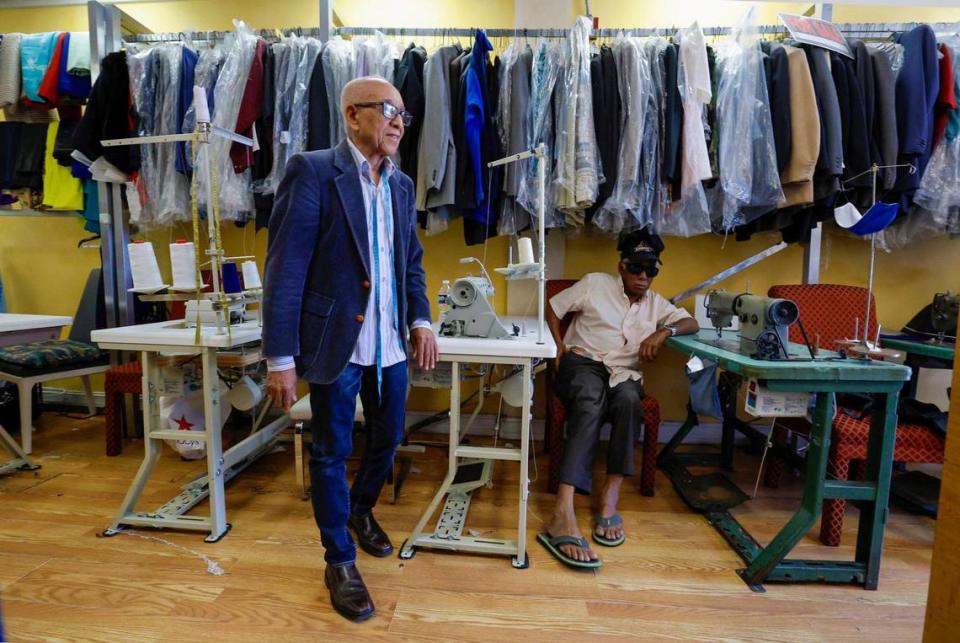‘My work is like art for me.’ Miami tailor figures he’s altered 2,000 suits since he was 14
Walking into Allapattah’s Sastreria & Confecciones Aquino tailoring and alterations shop feels like a journey back in time. Colorful thimbles of threads can be seen all over the small shop and custom guayabera shirts with intricate designs hang on the walls.
In the back of the quaint place, a man wearing a navy blazer, distressed jeans and dark brown loafers moves around energetically with measuring tape hanging from his neck. That man is the owner and tailor Fidel Aquino, a 73-year-old native of the Dominican Republic.
“I enjoy working,” he said, gesturing with the fervor of a high school student. ”My work is like art for me, so I do it with joy. When I tailor a suit, it has the perfect fit. I take pride in my work because it’s not about the money. If you do good work, the money will come.”
Aquino has been sewing and altering clothing since he was 14 in the Dominican Republic. He figures he’s worked on more than 2,000 men’s suits. The sophistication that comes with a tailored suit is priceless, he said. Typically, he spends two days working on a suit he’s tailoring and altering for his customers.
Aquino first visited Miami in the early 2000s and quickly fell in love with the city. In 2008, at the age of 58, he moved to Miami by himself before his wife, Quintina, 70, later joined him here. He got a $10,000 loan from a friend and after scouting different properties in Miami, he knew that setting up shop in the Dominican-friendly neighborhood of Allapattah would be perfect.
“All types of different people come here. We have affluent customers, as well as customers with less money. Everyone receives the same quality of service,” Aquino said with a smile.
Choosing to let his work speak for itself, he credited his faith in God as a source of inspiration throughout his entrepreneurial journey. Certainly, his work has done the talking and his skills have gained the attention of celebrity clients like Dominican rapper El Alfa, a Santo Domingo native known as “The King of Dem Bow.”
Operating a tailoring shop in the United States made more sense to Aquino than remaining in the Dominican Republic. His three children, Richard, 40, Darven, 32 and Betty 31, still live in Santo Domingo with their families.
As an entrepreneur, he found that Dominican government policies made it more difficult for individuals to start their own businesses. By comparison, he was able to get his shop in urban Miami off the ground relatively quickly. That was just the signal he needed that America was where he belonged.
Much of the appeal of Aquino’s shop comes from seeing the vintage sewing machines and benches customers see upon entering. Having worked as a tailor for much of his life, he pointed to his head when he talked about the skills he’s refined over the years of taking measurements and understanding his clients’ senses of style.
Still, he is always looking for ways to improve his workflow. As a small business owner, he doesn’t always have the money to make improvements to his shop.
That changed when Aquino recently received a $15,700 grant from a Wells Fargo Bank fund for small businesses. Nonprofits Miami Foundation and Partners for Self Employment manage the disbursement of the grants locally.
“Check this out,” he said, as he tapped a button on the back of one of the new sewing machines. Suddenly, the machine began saying commands like an Alexa home device would. At $2,700 each, Aquino said the six new machines will enable him to do more tailoring. By upgrading his sewing machines and adding an embroidery machine, his shop can also do embroidery for customers.

Brittany Morgan, Miami Foundation’s director of economic resilience, understands the difficulties entrepreneurs of color face to secure capital to support their businesses. Industrial machines such as the sewing and embroidery machines Aquino uses are expensive, but she thinks the $15,700 investment in Aquino’s shop can double or triple the business he does.
“It’s really especially challenging for business owners of color to get capital even when they’re incredibly profitable,” Morgan said. “On paper, there’s just a lot of practices in underwriting and lending that tends to disadvantage business owners of color.”
Using Black households as an example, Morgan said those with an entrepreneur have a net worth 10 to 12 times higher than a Black family without a small business owner. Helping small business owners gain access to credit and capital can be “a game changer,” she said.
Back at his Allapattah tailor shop with business humming, Aquino sees the place as a continuation of his work. His next goal is to open another shop to the south in the Coral Way neighborhood and serve residents in a different area.
Even in his early 70s, he has no plans of slowing down. Quickly, he gets up from his seat at a sewing machine to show off the latest tailored suit he just finished after many hours.
“You can always make more money,” he said. “But you can’t make more time.”


